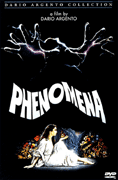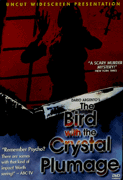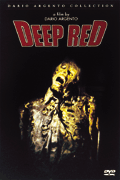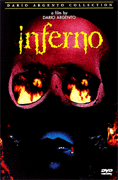DVDs
Uncut and restored, the films of Italian cult director Dario Argento are enjoying new life thanks to DVD's hunger for obscure and out-of-print titles. Arnold Salas looks at five of the latest releases to hit the home entertainment market.
 |  |
Black leather gloves, gleaming knife blades, murder, fetishism and cross-dressing. These are the staples with which Dario Argento has built a slavish cult following over a period of 30 shock-filled years. Dismissed by some as a purveyer of style over substance, Argento’s work is instantly recognizable. His trademark touches: vivid colour-schemes, aggressive soundtracks and a camera that seems to wander with a life of its own. It is this voyeuristic gaze that stays with you, for the films are about watching as much as they are about horror. Argento’s willful camera lures us in and then punishes us for watching. With many of the director’s most popular films long unavailable in the U.S. or butchered by censors, the new wave of Argento releases has been a veritable embarrassment of riches for film lovers with a taste for the macabre.
A former film critic, Argento made his splashy directorial debut at 30, after cutting his teeth as a writer on several spaghetti westerns (including Once upon a Time in the West). His first feature, The Bird with the Crystal Plumage (VCI Home Video, $29.99), was a surprise hit in 1970, doing quite well in the U.S. as well as Europe. The stylish, violent and visually beautiful film moved many critics to mark him as one to watch, although most were dubious about his choice of genres.
Written by Argento himself and loosely based on Fredric Brown’s pulp thriller The Screaming Mimi, Bird concerns a young American writer (Tony Musante) in Italy who is witness to a Jack the Ripper—style killer’s latest attack on a young woman. Forced to unravel the mystery and expose the killer before he becomes the next victim, our hero finds himself in a deadly game of cat and mouse. What in many ways could have been a standard murder-mystery is pushed to greatness by Argento’s imagery and some stand-out work by Academy Award winning cinematographer Vittorio Storaro. The scene in which Musante is trapped between doors of glass watching helplessly as a young woman bleeds to death is twistedly clever and stays with you long after the film is over.
Experiencing Bird on DVD is jarring to anyone who has seen the film before, either on domestic home-video or Japanese bootleg. Presented letterboxed and tweaked digitally for optimum sound and visuals, this Bird looks better than it ever has. Besides the uncut film, the DVD contains the U.S. theatrical trailer and Ennio Morricone’s complete original score.
 Forging ahead in the thriller genre, Argento’s next taste of success came in 1975 with Deep Red (Anchor Bay, $29.99), a huge European hit and his most popular film in Italy to date.
Forging ahead in the thriller genre, Argento’s next taste of success came in 1975 with Deep Red (Anchor Bay, $29.99), a huge European hit and his most popular film in Italy to date.
An uneven mix of mystery, ultraviolent murder and Italian-style comedy bits, Deep Red follows a jazz musician (David Hemmings) as he plunges into a world of murder, tranvestism and hidden secrets. The film is colored by ineffectual males, dominant females and much more gender-role reversal. Fetishism is a key element in the film, as is the voyeuristic and narcissistic eye.
Anchor Bay offers the film restored to its original running time of 125 minutes, including many scenes never before seen in the U.S. Letterboxed at the 2:35:1 ratio, the DVD has flawless color and a remarkably clear picture. Add to this a remixed 5.1 Dolby audio track and you have a package designed to send Argento fans into digital ecstasy. Extra features include theatrical trailers and an interview with the apparently reticent director.
Does the film itself merit such a lavish presentation? Yes, although Deep Red is not without its flaws. Overlong, the film loses much of the suspense and momentum so important to the thriller genre as a result of drawn-out conversations and out-of-place humorous touches. It’s clear why the American distributor trimmed these scenes.
Yet Deep Red has its moments: breathtaking visuals, interesting characters and some genuinely scary scenes. More technically adept than any of his previous work, this was an indication of where the director could – and would – go.
Another U.S. hit for Argento followed in 1977 with the now legendary Suspiria. This supernatural tale took his unusual camerawork and vivid colors further than ever, even using rare film-stock to achieve a different look. The film did much to convert jaded film-buffs, and a cult director was truly born.
 Following quickly on the heels of Suspira, his next feature, Inferno, was not to fare as well. A co-production with 20th Century Fox (Suspiria’s U.S. distributor), the film ended up not being released at all in the U.S. An edited version that appeared on the home video market later on was the only way to see the film at all, making the Anchor Bay DVD all the more desirable.
Following quickly on the heels of Suspira, his next feature, Inferno, was not to fare as well. A co-production with 20th Century Fox (Suspiria’s U.S. distributor), the film ended up not being released at all in the U.S. An edited version that appeared on the home video market later on was the only way to see the film at all, making the Anchor Bay DVD all the more desirable.
Avoiding the chattiness of Deep Red, Inferno (Anchor Bay, $29.95) is a hallucinatory nightmare painted with a bewitching palette of lush tones. A young woman (Irene Miracle) living in an old New York building starts to suspect that her home is actually one of the houses of the damned. Her investigations and those of her brother (Leigh McCloskey) set off a bloody chain of events, culminating in the promised conflagration of the finale.
Italo-horror legend Mario Bava did some of his last work here, acting as technical supervisor on Inferno’s more startling sequences, including an underwater encounter with a swimming corpse.
Letterboxed at an 1:81:11 ratio, the Anchor Bay disc presents the film uncut and digitally restored — the way it was meant to be seen. It is another top-notch job from Anchor Bay, the transfer flattering Inferno’s softer-focus look and pulsing colors. Extras include trailers and interviews in which Argento refers to Inferno as his "purest and most sincere" film. Leaving behind the supernatural, it was a return for Argento to the mystery-thriller genre for which he was first known.
Tenebre (Anchor Bay, $29.89) would appear to be a 1980s version of Bird but for a convoluted, logic-defying plot that invites the viewer to suspend disbelief totally and enjoy the ride into madness. The title refers to darkness, perhaps our inner demons, for the film is suffused with a cold, almost flourescent light that allows no shadows to linger.
Like Bird, Tenebre’s protagonist is an American writer in Italy, this time being stalked by a mad killer paying homage to his own murder-mysteries. The bodies begin to pile up, with one lovingly shot slashing after another. It contains some of Argento’s most famous scenes, including an outrageously long crane pan shot, a graphic ax-dismemberment and an erotic beach scene with a beautiful girl.
Anchor Bay offers the film letterboxed in a 18:85:1 ratio with the clearest of picture and sound. Also included are an audio commentary with the director and composer, two behind-the-scenes segments and alternate end-credits.
Insects, monkeys and mutants run amok in Argento’s quintessential ’80s film, the underappreciated Phenomena. On the surface a horror tale about ESP and serial killers, the film actually offers many interesting readings. Jennifer (Jennifer Connelly) is an American teen arriving at a Swiss boarding school in time for a series of brutal murders of young women. She is immediately marked as "weird" and a jinx by the other girls, her only friend being butchered soon after her arrival. Her special connection with nature, and insects in particular, make her the only one capable of finding the killer and stopping him. Enlisting the help of a crippled entymologist (Donald Pleasance) and his lovable chimpanzee, Jennifer heads for a final confrontation with a twisted mind. One of Argento’s most bizarre stories, it is perhaps also his most personal, heartfelt and idiosyncratic. Phenomena plays like a meditation on a young girl's fear of womanhood and sexual maturity, with Connelly sublimating her nascent sexuality into her saint-like communication with nature, animals and spirituality. Haunted by the specter of a mother who abandoned her and a much-loved father always away on business, she can only find her own identity by renouncing sex, the path to unhappiness.
Anchor Bay’s DVD offers Phenomena with 28 minutes unseen in its U.S. theatrical release, in a letterboxed, remastered transfer with Dolby audio and multiple language tracks. A grab bag of surprises, the extras section includes music videos, trailers, an interview with Argento and a behind-the-scenes short. Add to that an audio commentary with the director and you have a package well worth picking up.
A more recent Argento effort is 1996’s The Stendhal Syndrome (Troma, $27.99), another film originally slated for U.S. release but eventually relegated to life on expensive bootleg. Nevertheless, it managed to find fans, restoring faith in Argento’s twisted genius and recruiting new followers.
A cruel excercise in splatter-punk, The Stendhal Syndrome is the story of a young policewoman (Asia Argento) who is strangely affected by paintings and other artwork. A handsome madman (Thomas Kretchman) who has been stalking her takes advantage of these trance-like episodes to torment her further, eventually making her watch his sex crimes. This is a more brutal Argento, to be sure, making for difficult viewing at spots. Accordingly, the film’s look is also different — darker, colder, at times even ugly.
The casting of Argento’s daughter in the lead role is interesting, especially in light of the various attacks and rapes the character is subjected to. If the intention was to cast a lurid pall over the already gruesome goings-on, the director succeeded admirably.
But this is still an Argento film and, as such, it bears his telltale stamp: more gender play, absent mothers and a character’s renunciation of her sexuality.
Troma’s no-nonsense letterboxed disc is a sharp, clear transfer that is acceptable if not extraordinary, although some night scenes seem overly black. Included are an interview with Argento and a theatrical trailer. Stendhal, a highlight of Argento’s later work, is a film to see.
Not as praiseworthy is Argento’s most recent film to date, an inexplicable and misguided take on The Phantom of the Opera (A-Pix, $27.95). One of those rare cases of a film in which nothing quite works, we end up up with a hammier-than-ever Julian Sands as the notorious Phantom (now replete with sewer rats!) and Asia Argento as the not-so-chaste singer he loves. There’s so much wrong here that it’s hard to pinpoint where Argento went astray, but it seems as if two different films were being made. The gory deaths for once are out-of-place and seemingly thrown in as an afterthought.
The DVD is a pretty standard no-frills job with a passable transfer, but you probably weren’t going to get this one anyway. Here’s hoping his next film is better (could it be worse?). With sales of previous Argento titles on DVD far surpassing expectations, things look good for those desiring even more. The ever burgeoning DVD format’s need for product will only ensure that more unavailable gems make their way to stores.
Argento fans can look forward to Anchor Bay’s forthcoming release of Suspiria, easily his most famous title, in its original uncensored version (and featuring a widescreen 2.35:1 transfer enhanced for 16x9 TVs) on DVD in early 2001.
A restored, uncut DVD of Suspiria... what a frighteningly delicious thought.
VOD CALENDAR


 See the VOD Calendar →
See the VOD Calendar →


